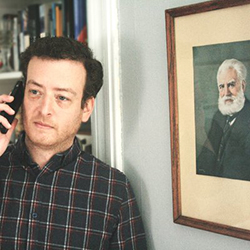By Dan Rubinstein
On July 8, a major Rogers Communications outage impacted more than 12 million customers and knocked about one-quarter of the country off the internet.
Cellphones on the Rogers network could not make 911 calls. Government units like the Canada Revenue Agency and passport offices crashed, as did some medical systems. Interac went offline, forcing thousands of stores to close, contributing to an estimated economic toll of nearly $150 million in just 15 or so hours.
To Carleton University PhD candidate Ben Klass and his supervisor, communication researcher Dwayne Winseck, the shutdown exposed the risks of relying on a few colossal companies for what has rapidly become vital infrastructure.

Prof. Dwayne Winseck
“When we’re going about our daily lives relying on a technology and it fails spectacularly, everyone is suddenly confronted with our reliance on a small number of huge companies to provide crucial services,” says Klass.
“We’ve placed a lot of trust in Bell, Rogers and Telus. The federal government has allowed them to become very large and enjoy privileges that accrue to large companies. But the outage reminds us that bigger is not always better.”
Although the domestic telecommunications landscape is dominated by this Big Three, beyond complaining about high mobile bills, most Canadians don’t often consider their monopolistic power. Nor do we fully comprehend the sweeping influence of global giants like Google, Apple and Facebook.
To better understand the power and responsibilities of these corporations, and to help regulators safeguard citizens, policymakers need accurate, meaningful and timely information about media concentration.
That’s the main goal of the Global Media & Internet Concentration Project (GMICP), a $2.5-million initiative, funded by the Social Sciences and Humanities Research Council and led by Winseck, which spans nearly 40 countries and held its inaugural conference at Ottawa’s Carleton Dominion-Chalmers Centre on August 18 and 19.
The hybrid conference, with both in-person attendance and digital participation, examined concentration trends within several GMICIP countries, including Canada, and discussed the impact of these developments on national policy and regulatory agendas. Imperial College London economics professor Tommaso Valletti, the former chief competition economist of the European Commission, delivered the keynote address.
“Communications infrastructure is kind of an invisible substrate to everyday life,” says Winseck.
“For nearly 200 years, media industries have developed in close proximity to big tech. This has a tremendous bearing on our society, economy and democracy, yet it just percolates away in the background. Until it bursts into the public consciousness and reminds us that we need an empirical foundation of understanding that allows us to make good governance decisions.”

Learning from the Rogers Outage
Klass, whose research explores why Canada’s three-decade-old policy of encouraging more competition in the telecommunications industry hasn’t delivered on this promise, believes we can learn from the Rogers outage at the micro and macro levels.
Up close, for example, it showed that the Big Three must create a mutual assistance protocol so people are not cut off from 911 during outages — a requirement that the federal government finally appears serious about.

PhD candidate Ben Klass
The bigger picture, especially with a proposed merger between Rogers and Shaw Communications going through the approval process, involves asking what Canada wants its communications environment to look like.
Citing parallels such as decentralized electricity grids, Klass suggests there could be room in the sector for players like Saskatchewan’s crown-owned SaskTel.
“There’s strength in diversity and this doesn’t just apply to culture,” he says.
“It applies to the economy as well. In fact, one of the big ideas behind the internet is decentralization. It’s not inevitable that we have a few big networks.”
Viewed though a historical perspective, however, Winseck says it’s simplistic to blame concerns like polarized public opinion, surveillance capitalism and the meltdown of democracy solely on big tech. Media concentration is complicated business, involving both physical infrastructure and content, which are interrelated yet vastly different.
“How do you judiciously weigh the influence of all of the big players,” he asks, “without a robust, systematic and empirical evidentiary base?”
 Both Winseck and Klass don’t discount the potential for effective regulation from the CRTC, which has presided over telecommunications in Canada for decades and has a number of tools that can be deployed.
Both Winseck and Klass don’t discount the potential for effective regulation from the CRTC, which has presided over telecommunications in Canada for decades and has a number of tools that can be deployed.
For starters, companies could be compelled to adhere to information disclosure requirements, so the public knows how many subscribers they have, what their revenues are, how much they’re investing in Canada — “opening up the black box,” says Winseck, “so these entities can be held accountable.”
Secondly, personal privacy and data protection rules should be updated and enforced. Additional gatekeeping rules could limit market share.
“Right now, consumers basically have to trust that companies like Google and Rogers are doing the right thing,” says Winseck.
“And guess what? It’s not always wise to trust enormous conglomerates, multinational or domestic.”
Tuesday, August 9, 2022 in Events, Journalism and Communication, Technology
Share: Twitter, Facebook



